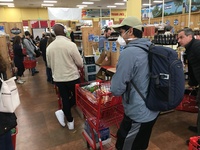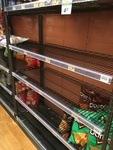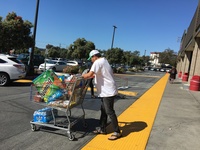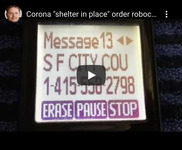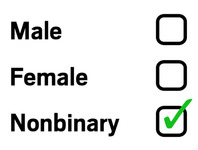 |
| Angelika/Mike Schilli |
|
|
|
Angelika Even though the esteemed Mr. Trump claimed last week that the virus was a foreign one and could be stopped by imposing a travel ban on EU countries, no one can deny that the virus is also spreading in the USA. However, since there are still not enough tests, no one knows exactly how many people are already walking around with the virus. The number of unreported cases is probably extremely high, leading experts to suspect that the situation here will be similar to Italy in the coming weeks. Now, there is finally an attempt to decisively slow down the number of infections. This is a Herculean task in a country that is not only vast but has always valued individual freedom and minimal government intervention. Not to mention the unbalanced and outrageously expensive healthcare system.
How does our life look now, specifically? Michael has been working from home for almost two weeks. Not only did Apple send their employees to work from home, but all the other big companies like Facebook, Microsoft, Google, etc. did the same. This is relatively unproblematic for most employees in these companies. Michael already works from home every Wednesday and Friday. He says those are the days when he gets a lot done and is most productive, and of course, he can lounge around in sweatpants all day and go surfing during his lunch break. "Home office" is therefore not a foreign concept to Michael.
Until Friday of last week, I was still driving to school every day. However, because large tech companies were already allowing their employees to work from home, I at least got to enjoy dreamlike traffic conditions during the heaviest rush hour. Normally, it takes me up to 50 minutes to get to work by car for a little over 30 kilometers, because at times the freeway resembles a parking lot more than a highway. But last week, it was smooth sailing every day, and I made it to my school in under 30 minutes.
However, our school is now closed for at least 3 weeks because, as is well known, children are germ spreaders. Since children apparently show hardly any symptoms with the virus, we have essentially been playing Russian roulette for weeks. Our students who were coughing wildly were sent home, but since there are not enough test kits in the USA, children are very rarely tested for Corona unless they show severe symptoms. To make matters worse, children tend to cough, sneeze, and sniffle constantly during the colder season, but it is usually just simple colds. The only thing we could do was to ensure that our kids washed their hands thoroughly.
Desks and doorknobs were also constantly disinfected, and the children were encouraged to cough into their arm pits. However, anyone who has worked with or raised children knows that this is easier said than done. I can't even count how many times a child has coughed, sneezed, or spat heartily on their desk right in front of me. And I work with children who are not always easy to handle, who sometimes forget to wash their hands despite multiple reminders, or prefer to play with the water without incorporating the soap into their play. Nevertheless, we tried all sorts of tricks: cool videos about the coronavirus and hygiene, comics, rewards, songs (for example, singing "Happy Birthday" twice while washing hands).
Of course, it is not an easy decision to close schools, because where are children supposed to go when their parents have to work, not to mention missing lessons. Going to school also means structure and continuity, which is of enormous importance, especially for the children I work with. Therefore, our school has decided to teach the children online ("remote learning"). Most of our families are well-equipped technically, and for others, we sent the children home with the school's own Chromebooks (Google laptops). We already work a lot with new technologies in our school. Naturally, we also provided school notebooks and books. My colleague, who is the trained elementary school teacher in the class, will start sending our students learning material every day next week, which they have to work on daily.
Among other programs, we use the non-commercial website of Khan Academy. The site offers free lesson units with YouTube videos and exercises that are based on curricula. The teacher can assign specific lesson units to each student for completion and can see not only how long the student takes but also how successful they were. Salman Khan founded the portal in 2009, which is funded by donations. For example, Google donated 2 million dollars in 2010. The idea for Khan Academy came about because Khan used the internet with the help of "Yahoo Doodle Images" to tutor his cousin in math. Other cousins also found the explanations great, and Khan started posting his videos on YouTube. We are curious to see how our children will receive the whole thing and whether the little rascals are really ready to learn independently. We are all a bit skeptical about this, as even regularly completing homework usually doesn't work out so well.
Since I work as a behavioral therapist in the classroom and am primarily responsible for helping children with their social behavior, it is more difficult for me to influence this when the children are not physically present at school. Currently, the plan is for us to write reports and take on other administrative tasks, and of course, to prepare our "Social Emotional Learning" lessons, which we behavioral therapists teach in our classes every day. It is still unclear what will happen if we have to remain closed for a longer period. Our Governor, Gavin Newsom, mentioned today that it is quite possible that schools in California might not reopen until the summer holidays. Unbelievable!
By the way, although the governor can order the closure of all public schools in California in an emergency, he usually prefers to hold back and leave the decision to the individual school districts. There are a whopping 977 school districts in California. Currently, 922 of them have closed their schools due to the virus, although the duration of closures varies. Delegating decision-making authority to the local level does not make the situation any easier in times of crisis. This is often even more complex than in Germany, where the responsibility for schools lies with the individual federal states.
Panic buying of necessities like toilet paper and all kinds of disinfectants has, of course, also happened here. The supermarkets are full of people and some shelves are empty. You know: pasta and tomato sauce, rice, flour, canned goods. Funnily enough, the snack items were also quite thinned out here, as well as all frozen ready meals like frozen pizza. At Costco (comparable to Metro in Germany), the rush is enormous and on some days it's hardly manageable. The sister of an employee at my school works at Costco and reported that last Friday morning, 2000 people had already shown up at her Costco, an absolutely insane number, even for this mega market. She also mentioned that the police had been called several times because customers were fighting over products or yelling at the checkout because the sale of some products was limited. We have experienced the supermarkets being full, but have not yet seen any riot-like scenes. However, we avoid stores where there is already a line forming outside the door. We always have supplies at home despite having little storage space in the apartment, so we are prepared for earthquakes. Michael is our shopper and he always meticulously ensures that nothing runs out and that there is always enough of everything. I have often complained about this because sometimes I don't even know where to put all the stuff. But now I am glad about it.
